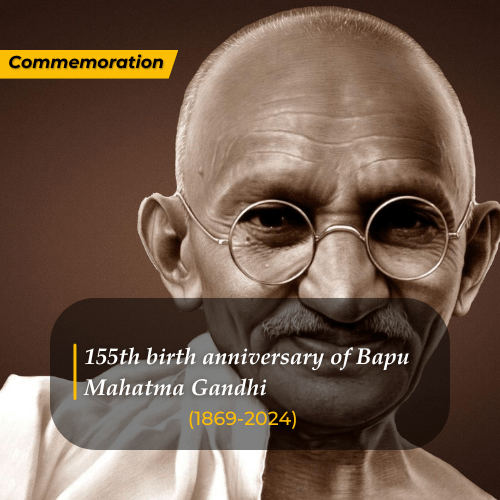- PHONE NUMBER : +91 98775 69508
- EMAIL ADDRESS : asc@upaay.co
- Venue Location : The Lalit, Chandigarh
Archives
Categories
 Tribute to life and legacy of Mahatma Gandhi
Tribute to life and legacy of Mahatma Gandhi
This year’s Legal Convention 2024 holds special significance as we commemorate the 155th birth anniversary of Mohandas Karamchand Gandhi—revered worldwide as Mahatma Gandhi, the Father of the Nation of India. As we gather to reflect on the legal and constitutional foundations of India, we also pay tribute to Gandhi’s life, his philosophy, and his profound impact on the nation and the world. Let’s briefly walk through his life journey: Mahatma Gandhi was born on October 2, 1869, in Porbandar, Gujarat. He emerged as a towering figure in the Indian independence movement, leading the struggle against British colonial rule through his unique philosophy of non-violence (Ahimsa) and civil disobedience (Satyagraha). Gandhi’s approach to freedom was not merely political; it was rooted in a deep moral and ethical commitment to truth, justice, and the dignity of all people. Gandhi’s influence extended far beyond India’s borders. His methods of peaceful resistance inspired movements for civil rights and freedom across the globe, from the American Civil Rights Movement led by Martin Luther King Jr. to anti-apartheid struggles in South Africa. His teachings remain a beacon of hope for those seeking justice and equality in the face of oppression.
Contributions to Indian Society and the Legal System
Mahatma Gandhi’s contributions to Indian society are vast and multifaceted. He advocated for the upliftment of the marginalized, including women, Dalits, and the poor, challenging the entrenched
social hierarchies of the time. Gandhi’s vision for India was one of inclusive progress, where economic self-reliance and moral integrity would lay the foundation for a just society. Although not directly involved in the drafting of the Indian Constitution, Gandhi’s ideals profoundly influenced its framers. His emphasis on truth, non-violence, and the moral responsibility of governance are woven into the fabric of the Constitution. Gandhi’s advocacy for decentralized governance, through the empowerment of village panchayats, is reflected in the constitutional provisions that promote grassroots democracy.The Convention’s Tribute to Bapu
The Legal Convention 2024 honors Mahatma Gandhi’s 155th birth anniversary by dedicating sessions to the future of rule of law and empowerment of legal fraternity, in line with the developed nation vision of 2047. As we remember and celebrate the life of Mahatma Gandhi, we reaffirm our
commitment to the values he held dear—truth, justice, non-violence, and equality. The 155th anniversary of Bapu’s birth is not just a moment to look back, but a call to action for all of us to strive towards a more just and peaceful society, in the spirit of Gandhi’s teachings. Join us in this special commemoration, as we draw inspiration from the legacy of Mahatma Gandhi and reflect on how his timeless wisdom can guide our efforts to build a better future. Tribute to life and legacy of Nani Palkhivala
Tribute to life and legacy of Nani Palkhivala
The Legal Convention 2024 is proud to commemorate the 80th anniversary of Nani Palkhivala’s illustrious career as a lawyer, celebrating his unparalleled contributions to the Indian legal system and his enduring influence on constitutional law.
The Life and Legacy of Nani Palkhivala
Nani Ardeshir Palkhivala was born on January 16, 1920, in Bombay (now Mumbai). From humble beginnings, Palkhivala rose to become one of India’s most distinguished jurists, known for his exceptional intellect, eloquence, and profound understanding of the law. He began his legal career in 1944, and over the decades, he established himself as a towering figure in Indian law, admired for both his legal acumen and his unwavering commitment to justice. Palkhivala’s expertise spanned various branches of law, including constitutional law, taxation, and civil liberties. He was a formidable advocate, known for his clarity of thought and his ability to present complex legal arguments in a manner that was both persuasive and accessible. His contributions to the legal profession were not limited to the courtroom; he was also an accomplished author, a passionate defender of civil liberties, and a public intellectual whose writings and speeches inspired generations.
Key Contributions to Indian Constitutional Law
Nani Palkhivala’s most significant contribution to Indian legal history was his role in defending the Constitution during some of its most challenging times. He is perhaps best known for his defense of the Basic Structure doctrine in the landmark Kesavananda Bharati case (1973). In this case, Palkhivala argued with unmatched conviction that the Parliament did not have the power to alter the basic structure of the Constitution, a position that was ultimately upheld by the Supreme Court of India. This decision has since become a cornerstone of Indian constitutional law, protecting the fundamental principles of the Constitution from being eroded by transient political forces.
Palkhivala’s legal career also included notable contributions to tax law, where his expertise and advocacy led to more equitable tax policies. His annual budget speeches became legendary, drawing large audiences eager to hear his insights on economic and fiscal matters. Throughout his career, Palkhivala was a staunch advocate for the rule of law, individual freedoms, and the integrity of the judiciary.
The Convention’s Tribute to Nani
In celebrating 80 years since Nani Palkhivala began his legal career, the Convention pays tribute to his extraordinary contributions to Indian law and society. The second day of the convention is dedicated to Nani’s vision of future lawyers and his thrust on academic excellence. Join us as we honor the 80th anniversary of Nani Palkhivala’s entrance into the legal profession, whilst we celebrate his legacy as a champion of justice, a guardian of constitutional values, and a role model for lawyers and citizens alike.
